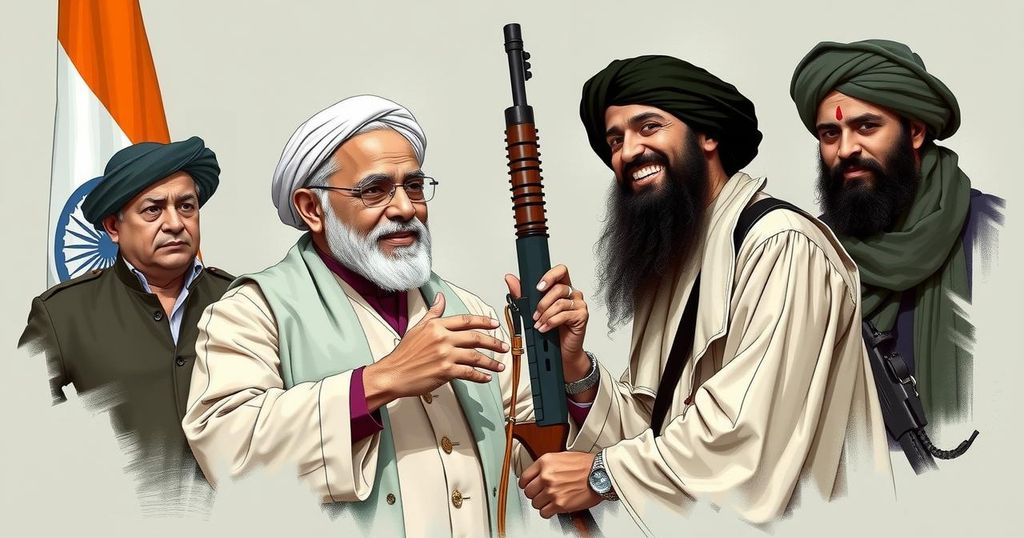India’s Diplomatic Engagement with the Taliban: Strategic Necessity or Ethical Dilemma?
India’s recent meeting with the Taliban in Dubai signals an intent to bolster relations, acknowledging the Taliban as a significant player in Afghanistan’s political landscape. Despite historical ties and investments, India faces ethical dilemmas and security concerns regarding engagement with a regime marked by radical ideologies. Analysts suggest that while India’s efforts are a natural progression, a coherent policy framework is essential to navigate the complexities of Afghan society and politics appropriately.
This week’s meeting in Dubai between Indian Foreign Secretary Vikram Misri and Taliban Acting Foreign Minister Amir Khan Muttaqi has shed light on India’s strategic intentions toward Afghanistan. This high-level engagement marks a significant escalation of India’s gradual relationship-building with the Taliban over the past year. Observers suggest that while India has historically maintained a strong presence in Afghanistan, this meeting reflects a shifting geopolitical landscape, especially in light of recent tensions with Pakistan.
India’s accumulated investment of over $3 billion in Afghanistan over two decades includes aid and reconstruction efforts. The Indian Ministry of External Affairs emphasized ongoing dialogue on regional developments, trade, and humanitarian cooperation. Notably, the Taliban recognized India as a “significant regional partner” following this meeting, suggesting a mutual recognition of the importance of dialogue between the two parties.
The timing of this meeting is particularly noteworthy, coming shortly after India condemned Pakistan’s recent air assaults on Afghan territories, resulting in substantial casualties. Furthermore, the Taliban’s appointment of a consul in Mumbai signals an intent to strengthen diplomatic ties, mirroring engagements with other nations such as Russia, China, and Iran.
Analysts posit that these developments indicate a pragmatic acknowledgment by India of the Taliban as a legitimate governing entity in Afghanistan. Kabir Taneja from the Observer Research Foundation comments that this is a continuation rather than a departure from India’s existing cautious approach. Similarly, Raghav Sharma of the Jindal School of International Affairs notes that India’s engagement remains somewhat superficial, lacking deeper commitment or acknowledgment of the extent of relations.
Despite potential benefits, such as resuming visa issuance for Afghans in various sectors, Sharma raises concerns regarding India’s security posture toward the Taliban’s ideological leanings. Additionally, there exists an ethical dilemma: India’s promotion of democracy is challenged by its silence on issues like the prohibition of girls’ education in Afghanistan under Taliban rule.
India’s historical ties to Afghanistan necessitate a clear policy framework, particularly after the fall of the republic government. Observers warn that any over-reliance on the Taliban for regional stability could undermine India’s broader interests and security strategies. Taneja cautions against placing too much reliance on a single entity in a landscape marked by evolving power dynamics and rapid political shifts.
In conclusion, while India’s overtures to the Taliban may reflect an urgent need to adapt to the evolving geopolitical climate, the underlying complexities and potential ramifications warrant a measured approach. There remains a need for India to establish a comprehensive understanding of Afghan socio-political realities, ensuring its long-term interests are safeguarded within this volatile landscape.
The article discusses the recent diplomatic meeting between India and the Taliban, highlighting India’s evolving diplomatic strategy towards Afghanistan amidst a changing geopolitical environment. It emphasizes India’s historical investments and relationships in Afghanistan while assessing the implications of engaging with the Taliban as a legitimate government. The context includes mounting tensions with Pakistan, potential humanitarian implications, and the ethical dilemmas faced by India as it attempts to navigate its foreign policy in light of the Taliban’s regime change.
The meeting between India and the Taliban represents a significant diplomatic move amid rising geopolitical tensions in the region. While India seeks to engage with the Taliban pragmatically, it must navigate ethical considerations and evolving power dynamics carefully. The need for a well-defined policy towards Afghanistan, along with an understanding of the local socio-political landscape, is critical for India to safeguard its interests and promote stability in the region.
Original Source: www.aljazeera.com








Post Comment